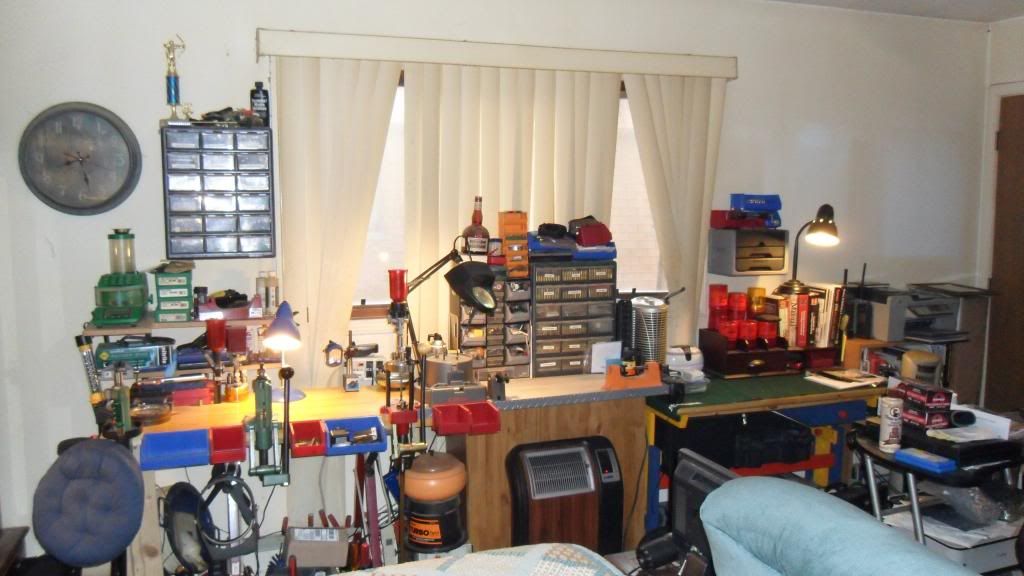I'm speaking as an individual with multiple college level courses in economics which comprised a portion of my honors degree Bachelor of Arts, a Juris Doctor, a private entrepreneur, while I'm carrying nearly a 4.0 grade point average and 1/2 through my Masters of Business Administration degree, with "A's" in Accounting and Economics courses at graduate level:
If it's a hobby, then the cost is mostly irrelevant if you enjoy it and can afford it. All hobbies are costly - skiing, camping, skydiving, etc. My snowboarding hobby is expensive and offers zero return. It's not for economics, it's fun.
If this is to SAVE MONEY, you must factor in the value of:
-Cost of time - economic term is "opportunity costs." This is not just as you sit at the press. Factor in time setup, building bench, researching loads, ordering components online, measuring, weighting, testing loads, etc.
-Cost of floor space - your presumably rent or pay mortgage on square footage of your home. That is a factor X/sq. ft.
-Cost of startup equipment, which you can depreciate or amortize out over X years.
Reloaders conveniently forget the hundreds of dollars spent on all the equipment, the many square feet of floor space (each square foot in your home represents somewhere around $XXX/ft that you pay rent or mortgage on - so if reloading requires you to upscale the size of your home to accommodate reloading, for increased costs, you must factor that in), storage space, the cash outlay for all components, the constant hunt for brass, lead, primers, and powder, the hazards of having that stuff around... (a recent article in one of these reloading forums about a guy who had a massive amount of gunpowder and it ignited and blew up his house) and the hours of sitting in front of what is effectively a little press in your home - like a little Chinese sweat shop...
And just peruse the reloader section. I see frequent posts about serious mistakes that reloaders make resulting in blowing up their guns or causing injuries. And by the way, nobody will shoot or buy your reloaded ammo - that's how much reloaded ammo is trusted. So you could make 100,000 reloads that are worthless to anyone but you. Conversely, in a pinch you could recoup your investment in a purchase of 100,000 factory rounds if you needed to.
Let's reasonably assume you can earn $30 an hour at your profession. Let's also assume that the outlay for a good reloading setup, dies, accessories, workbench, etc. is $1000. (A Dillon Square Deal is $400, and advertises 300-500 rounds per hour, but does not factor in the "down time" for measuring, weighing, testing, pulling mistakes, shopping for components, setup, tear down, which cut deep into that hourly rate).
Let's say you can make a sustainable average 100 rounds an hour for 10 cents per 9mm round. It would take you 1000 hours + $10,000 in materials to make 100,000 rounds (100 rds/hr x 1000 hours = 100,000 rounds). 1,000 hours of foregone work @ $30/hr is $30,000 + $10,000 in raw materials + $1000 for the setup. Total economic cost of this 100,000 rounds is $41,000. The hand loaded ammo also has no economic value to anyone but you, so nearly zero resale value (there is a thread on one of these reloading sites about a reloader that died and the family could barely give away piles of his ammo due to the dangers and hassles of pulling the bullets or shooting it). And this doesn't factor the learning curve, floor storage space/cost, inconvenience, and risks of rolling your own.
*Note you lose money with each bullet using this very reasonable example. Even if you increased production and cut the time to 300 rounds per hour, that brings the labor to $10,000 + $10,000 materials + $1,000 for the setup = $21,000.
Conversely, let's say you buy 100,000 factory rounds at 20 cents per round, for $20,000 with the click of a button.
http://www.ammunitiondepot.com/Feder...-p/cal9115.htm Right here is 115 grain Federal 9x19 for $19 cents per round. It took me 10 seconds to find it. You could probably get a better price if you bought a pallet of it.
And you work those 1000 hours at a profession or side-job, earning $30,000. Total cost is $30,000 earned minus $20,000 spent on ammo, so you come out AHEAD $10,000 cash PLUS the factory ammo will retain 100% of it's value and probably increase over time.
The analysis may be different for exotic or particularly expensive ammo, or ammo that needs special tweaking, or the opportunity costs of a person's earning potential...
In my mind, it's clear that for most people, buying factory is the way to go unless you just absolutely love reloading as a hobby or are otherwise on a fixed income or unemployed - which is a different analysis.
From a purist economic standpoint, if you're gainfully employed and could otherwise be working, you may never reach an economic "break even" point. If fact, you could actually lose money for each bullet you make versus just buying a pallet of ammo and working at your job instead.






